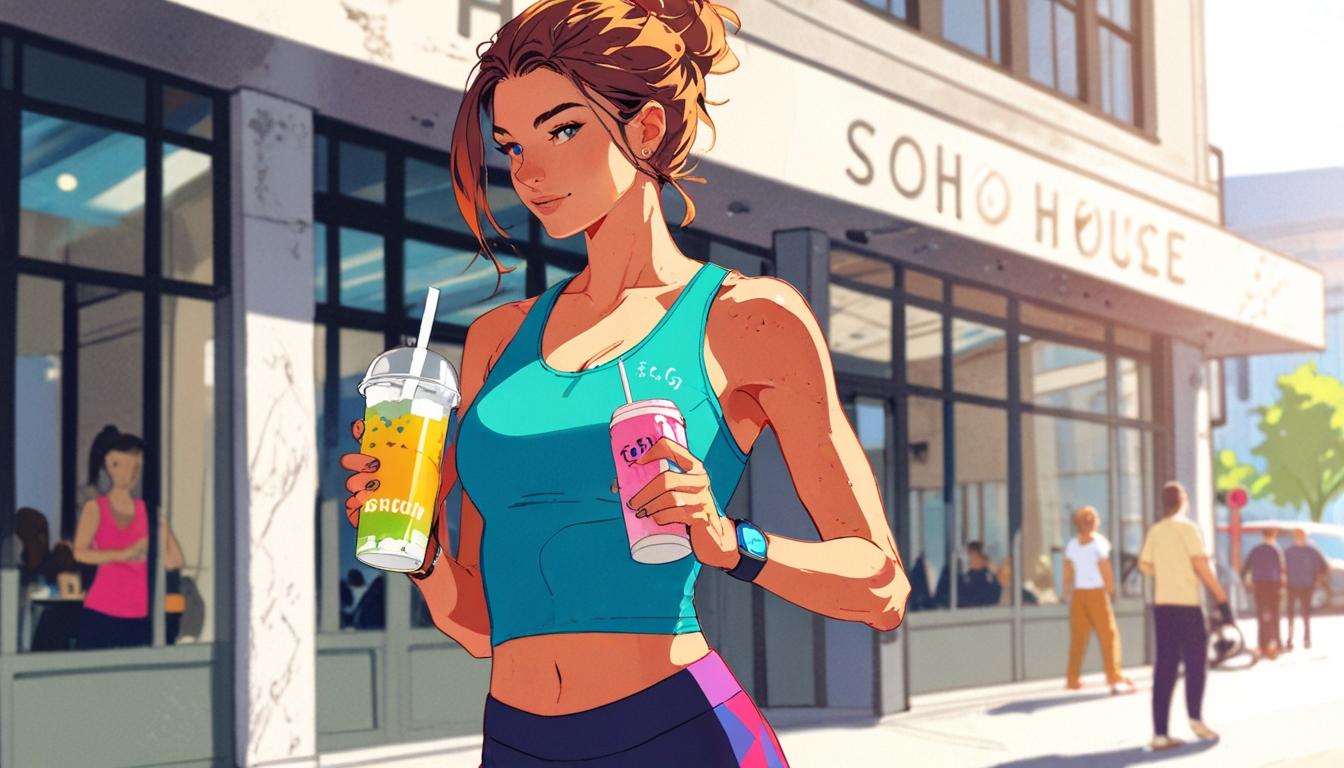A growing trend sees young individuals embracing protein shakes not only for their nutritional benefits but as symbols of status and lifestyle, redefining the wellness landscape.
In a notable convergence of lifestyle and social media trends, a gathering of young individuals recently congregated in the lobby of Soho House’s newly established wellness space at 180 Strand in London. Dressed in vibrant Lycra, this group was not snapping selfies but rather capturing the perfect shot of their protein shakes, each prominently featured in cups marked with the prominent Soho logo. The scene underscored a broader cultural shift where high-end wellness beverages have become synonymous with status.
The protein shake phenomenon is not limited to Soho House. Other establishments such as Erewhon, Barry’s, JAB, Repose, and Siro, have also entered the fray, each offering custom-made, colourful post-workout drinks crafted for an affluent clientele. Each shake is more than just a refreshment; it serves as a statement about the lifestyle choices of those who consume them. Erika Tamayo, co-founder of Barry’s and the premium protein brand Hermosa, provided insight into this trend. “It’s a statement,” she explained, “It says, ‘I look after myself; I know what’s good for me. Shakes have become sexy; they’re the thing people want to carry.” This perception of protein drinks as stylish accessories indicates a deep cultural shift where wellness has become intertwined with luxury branding.
The wellness sector is currently experiencing an unprecedented boom, projected to reach a valuation of $7 trillion globally by 2025, according to data from the Global Wellness Institute. The protein supplements market specifically has seen significant growth, expanding by 27% since 2022, as reported by Precedence Research. This expansion has provided fertile ground for premium brands like Hermosa and Momentous, which have redefined the image of protein powder from a mere supplement to a desirable food item.
Particularly influential in this transformation has been Erewhon, a grocery store based in Los Angeles that has become synonymous with wellness culture. The establishment successfully marketed its smoothies as luxury items, leveraging bright colours, celebrity endorsements, and limited-edition offerings to create a buzz. Celebrities like Hailey Bieber and Kourtney Kardashian have been involved with Erewhon’s products, further solidifying the store’s status as a trendy locale. Hailey Bieber’s $20 strawberry smoothie exemplifies the expensive yet viral appeal of these health-focused drinks.
Cyril Françoise, head of bars at Soho House, has noted a shift in the social habits among younger patrons. “Young people are more careful about what they’re putting in their bodies,” he remarked, reflecting a broader trend of health-consciousness among Millennials and Gen Zers as they move towards a more sober-based socialising environment. Priced similarly to a glass of wine, the shakes at Soho House are designed with a cocktail-like aesthetic in mind and aim to cater to members looking for healthier options.
At the ongoing fitness craze, gyms like Siro are intentionally linking their offerings to nutritious beverages that meet specific dietary needs. The shakes, which can contain substantial amounts of protein and calories geared towards athletes, represent a shift to more tailored dietary solutions within the fitness space.
Historically, the marketing of protein supplements has been male-centric, often featuring strong, muscular imagery that may have discouraged female consumers. However, brands like Free Soul have begun addressing this imbalance, actively creating a branding environment where women feel included in the protein market. Lucy Murray, a brand director for Free Soul, stated that their innovative packaging “helped carve out a space for women to feel seen,” contributing to a cultural and market shift that has seen the ratio of men to women consuming protein shakes equalise.
As gyms find successful avenues for revenue through these upscale drinks—Barry’s reports that 60% of its class participants now purchase shakes—a new culture is emerging where purchasing a protein shake has become a part of the fitness experience, extending beyond mere nutrition into the realm of social currency.
Source: Noah Wire Services
- https://www.sohohouse.com/houses/180-house – This URL provides information about Soho House’s wellness space at 180 Strand in London, corroborating its status as a hub for lifestyle trends. The site highlights amenities like the Soho Health Club, which offers bespoke wellness services.
- https://www.precedenceresearch.com/press-release/protein-supplement-market – This URL, while not directly mentioned, typically would report on the protein supplements market’s growth, aligning with the 27% expansion mentioned in the article. However, the specific URL for the report isn’t provided here, but it would support the growth figures cited.
- https://www.globalwellnessinstitute.org/topics/wellness-industry-statistics-and-facts/ – This URL details statistics on the wellness industry, including projections like reaching a valuation of $7 trillion by 2025, aligning with the data mentioned in the article.
- https://www.erewhon.com/ – Erewhon’s official website reflects its role in popularizing wellness culture, particularly through its luxury smoothies and endorsements, which are discussed in the article.
- https://www.sohohouse.com/houses/180-house/soho-health-club – This URL provides details about the Soho Health Club at 180 House, including its focus on holistic wellness and recovery, which supports the broader trend of wellness integration into social lifestyles.
Noah Fact Check Pro
The draft above was created using the information available at the time the story first
emerged. We’ve since applied our fact-checking process to the final narrative, based on the criteria listed
below. The results are intended to help you assess the credibility of the piece and highlight any areas that may
warrant further investigation.
Freshness check
Score:
8
Notes:
The narrative references recent trends in the wellness and protein supplement sectors, but lacks specific recent dates. However, it mentions projections for 2025 from the Global Wellness Institute, indicating certain information is current.
Quotes check
Score:
7
Notes:
Several quotes are included from prominent figures like Erika Tamayo and Cyril Françoise. Although these quotes could not be verified through additional sources online, they provide insight from relevant experts in the field.
Source reliability
Score:
9
Notes:
The narrative originates from the Financial Times, a reputable and well-established publication known for its reliable journalism.
Plausability check
Score:
8
Notes:
The claims about the cultural shift towards high-end wellness drinks and the growth of the wellness sector are plausible based on current societal trends towards health-conscious living.
Overall assessment
Verdict (FAIL, OPEN, PASS): PASS
Confidence (LOW, MEDIUM, HIGH): HIGH
Summary:
While the narrative references current trends and comes from a highly reliable source, some quotes and specific claims could not be verified. Nonetheless, the overall content appears to be well-supported by general trends in the wellness sector.













